 242 Price Street, now demolished | |
| Namesake | William Harris Crawford |
|---|---|
| Maintained by | City of Savannah |
| Location | Savannah, Georgia, U.S. |
| Coordinates | 32°04′27″N 81°05′12″W / 32.0742°N 81.0868°W |
| North | Houston Street |
| East | East McDonough Street |
| South | Houston Street |
| West | East McDonough Street |
| Construction | |
| Completion | 1841 |
Crawford Square is one of the 22 squares of Savannah, Georgia, United States. It is located in the middle row of the city's five rows of squares, on Houston Street and East McDonough Street, and was laid out in 1841. It is south of Greene Square and east of Colonial Park Cemetery on the eastern edge of the Savannah Historic District.[1] The oldest building on the square is at 224 Houston Street, which dates to 1850.[2]
Crawford Square is named in honor of Secretary of the Treasury William Harris Crawford, born in Amherst County, Virginia, in 1772.[3] Crawford ran for the U.S. presidency in 1824 but came in third, after winner John Quincy Adams and runner-up Andrew Jackson.[4]
Although Crawford is the smallest of the squares, it anchors the largest ward, as Crawford Ward includes the territory of Colonial Park Cemetery.[5]
During the era of Jim Crow, this was the only square in which African-Americans were permitted.[5]
The square contains playground facilities, a basketball court, and a gazebo.[6]
While all squares were once fenced, it is the only one that remains so. Crawford Square has also retained its cistern, a holdover from early fire fighting practices.[5] After a major fire in 1820 firemen maintained duty stations in the squares, each of which was equipped with a storage cistern.[7]
The Lady Chablis lived in the square prior to her rise to fame after her appearance in John Berendt's non-fiction novel Midnight in the Garden of Good and Evil.[8]
Dedication
| Namesake | Image | Note |
|---|---|---|
| William H. Crawford | 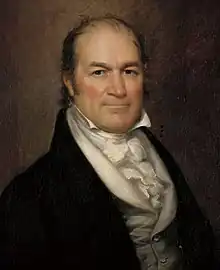 |
The square is named for William H. Crawford (1772–1834), United States Senator. |
Constituent buildings
Each building below is in one of the eight blocks around the square composed of four residential "tything" blocks and four civic ("trust") blocks, now known as the Oglethorpe Plan. They are listed with construction years where known.
- Northwestern civic/trust lot
- Southwestern civic/trust lot
- 227–231 Houston Street[2]
- 501–503 East McDonough Street (1890)[2]
- 505–507 East McDonough Street (1890)[2]
- 232 Price Street[2]
- Southwestern residential/tything lot
- Northeastern residential/tything lot
- Northeastern civic/trust lot
- John Tucker Property, 224 Houston Street (1850)[2] – oldest building on the square
- 548–550 East McDonough Street (1870)[2] – the Present Hotel (as of 2022)
- 221 East Broad Street[2]
- Southeastern civic/trust lot
- 230 Houston Street[2]
- 543 East McDonough Street[2]
- 540–544 East Perry Street[2]
- 227–229 East Broad Street[2]
- Southeastern residential/tything lot
Gallery
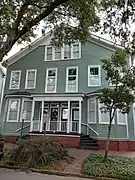 216–222 Houston Street
216–222 Houston Street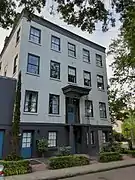 John Tucker Property, 224 Houston Street
John Tucker Property, 224 Houston Street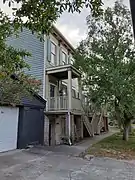 548–550 East McDonough Street
548–550 East McDonough Street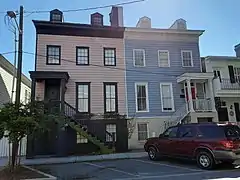 505–507 East McDonough Street
505–507 East McDonough Street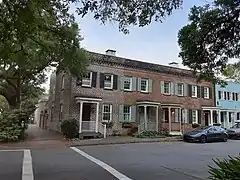 James Roberts Row House, 517–523 East Perry Street
James Roberts Row House, 517–523 East Perry Street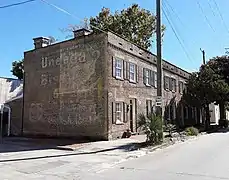 234–244 Price Street
234–244 Price Street
References
- ↑ Coastal Travel Guide's ‘’Savannah Squares’‘, accessed June 16, 2007.
- 1 2 3 4 5 6 7 8 9 10 11 12 13 14 15 16 17 18 19 20 21 22 23 24 25 26 27 Historic Building Map: Savannah Historic District – Historic Preservation Department of the Chatham County-Savannah Metropolitan Planning Commission (November 17, 2011), p. 42
- ↑ SavannahBest.com's Squares of Savannah, accessed June 16, 2007
- ↑ The Savannah Experience, Historic Savannah Squares, accessed June 16, 2007
- 1 2 3 Tour Guide Manual for licensed tour guides in the City of Savannah, accessed June 16, 2007.
- ↑ Savannah Scene Archived 2008-11-03 at the Wayback Machine magazine, May–June 2007, pp 10–11, accessed June 16, 2007.
- ↑ Chan Sieg (1984). The squares: an introduction to Savannah. Virginia Beach: Donning.
- ↑ "A Square as Reminder of Jim Crow Days". Freeman's Rag. Retrieved 2022-03-30.